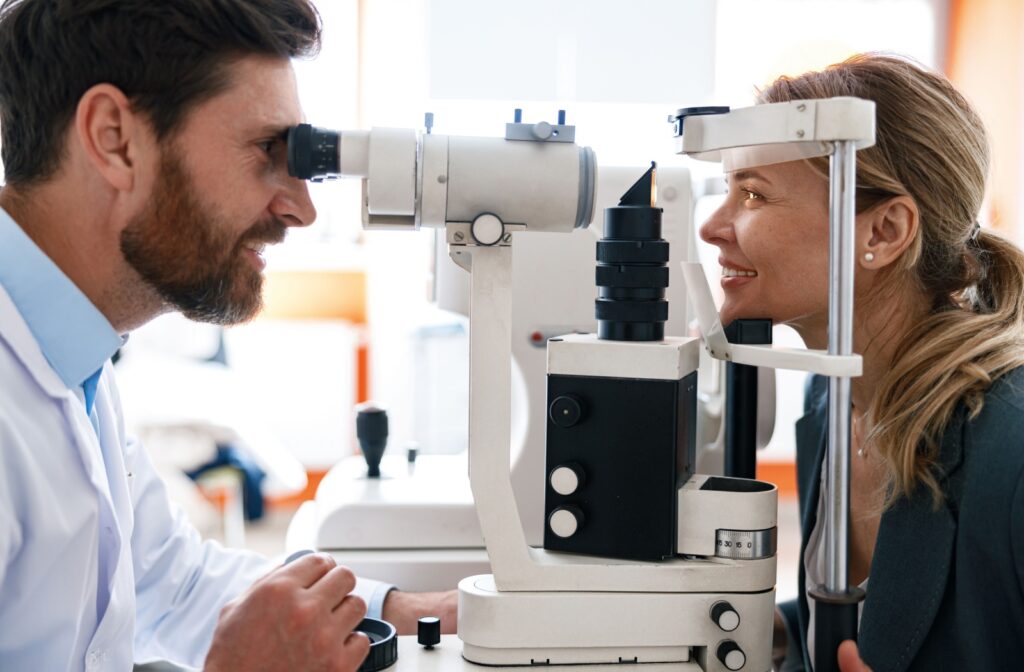Taking care of your eyes matters more than you might think. Regular eye exams don’t just check your vision—they play a key role in maintaining your overall eye health. Knowing what goes into an eye test can make the experience less stressful and more straightforward.
The exam should take 30–90 minutes, depending on your age, medical history, and current eye health. Your optometrist will perform a series of tests to look for any underlying eye conditions. Then, they’ll check your vision and update your prescription if needed. Feel free to ask questions during the exam—your comfort is always important.
What You Should Know Before an Eye Exam
Every eye test revolves around a simple goal—to assess your vision and eye health. These exams are designed to monitor changes in your vision, check your prescription, and address potential problems before they worsen.
However, the specific details depend on your unique situation.
Initial Consultation & Medical History
The exam doesn’t begin with testing. Instead, it starts with a conversation. Your optometrist will ask you a series of questions, typically involving:
- Your family’s medical history
- Any current medications you’re taking
- Previous eye conditions or surgeries
- Any new symptoms or concerns
This sets the stage for the rest of the exam. It helps your eye care professional pinpoint specific areas to test during your exam.
Vision Testing
Once the initial consultation wraps up, your optometrist will check your eyesight. They’ll work through different tests to check different parts of your eyes and vision.
These typically include:
- Visual acuity test to measure how clearly you see at various distances
- Refraction test to determine your exact prescription for glasses or contacts
- Peripheral vision test to check your side vision
- Eye movement tests to evaluate how well your eyes work together
- Color vision test to detect any color blindness
Depending on your needs, your optometrist may recommend additional tests.
Eye Health Evaluation
To fully understand your eye health, your optometrist will test your eyes’ overall health. This involves tests such as:
- Retinal examination to check the back of your eyes
- Eye pressure test to screen for glaucoma
- Visual field test to assess any blind spots
How Long Do Eye Exams Typically Take?
Eye exams are an effective way to stay on top of eye health and overall well-being. However, there isn’t one single type of eye exam.
Regular Comprehensive Exams
Comprehensive eye exams are the most common. They usually take 30–45 minutes and focus on checking vision clarity, updating prescriptions, and identifying general eye health concerns. They’re a routine procedure performed almost every day.
Children’s Eye Exams
As children grow and develop, their eyes constantly change. Regular eye exams for children help monitor their eye health and check development milestones. They also involve testing for conditions like myopia, hyperopia, and amblyopia. Children’s eye exams tend to take 30–45 minutes.
Diabetic Eye Exams
Diabetes is a complex condition. It doesn’t just affect blood sugar—it can compromise blood vessels at the back of the eye. Regular diabetic eye exams are key to catching potential complications long before they damage vision. These exams tend to take a bit longer, around 60 minutes or so, as they include more detailed imaging and retinal scanning.
Contact Lens Eye Exams
If you’re considering contact lenses or need to update your lens prescription, you’ll need a contact lens exam. These measure your cornea’s shape and overall health to give you a proper fit. These exams take between 45–60 minutes, though it varies depending on your eye health.

Factors That Influence The Eye Exam
Typically, you can expect your eye exam to last between 30–90 minutes, depending on your unique situation. However, this does depend on several underlying factors.
Medical History & Complexity
If you’re a new patient or have a detailed medical history, the consultation can take a bit longer. Symptoms like discomfort or vision changes also require more complex testing.
Purpose of the Appointment
The reason for your appointment shapes the overall timeline. Routine check-ups tend to be quicker, while diagnostic or symptom-focused visits require more comprehensive attention. A thorough approach is key, and your optometrist can answer any questions you may have.
When to Schedule Eye Exams
You should schedule an eye exam at least once every 2 years. This way, your optometrist can monitor any changes in your eye health and vision—and address problems before they worsen.
However, if you notice anything unusual, it helps to visit more often. Some signs it’s time for an eye exam include:
- Frequent headaches or eye strain
- Difficulty seeing clearly at night
- Blurry or double-vision
- Sudden flashes of light or floaters
- Persistent dryness or irritation in your eyes
It’s better to be safe than sorry. Your eyes and vision are precious, and your eye care professional can help keep them in excellent shape.
Is It Time for Your Next Eye Exam?
Getting an eye test is a routine part of maintaining overall health. Through routine tests, our team at Griffin Optometric Group can help you effectively manage your eye health and vision.
You deserve clarity, and we’re here to help, so book your next eye exam today! We’re ready to help you and your family with your vision.




